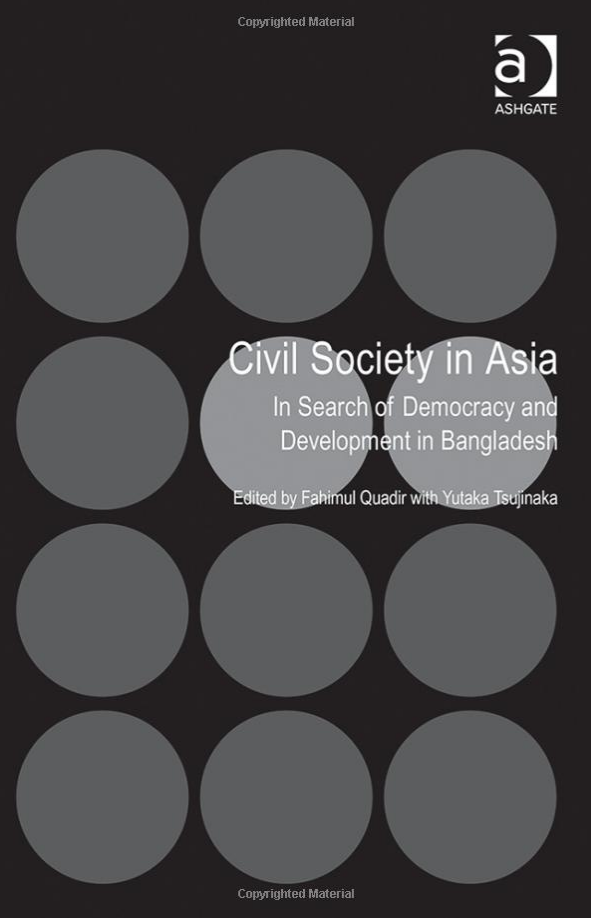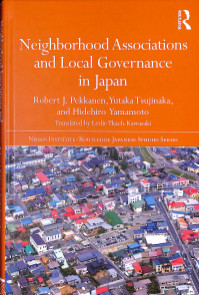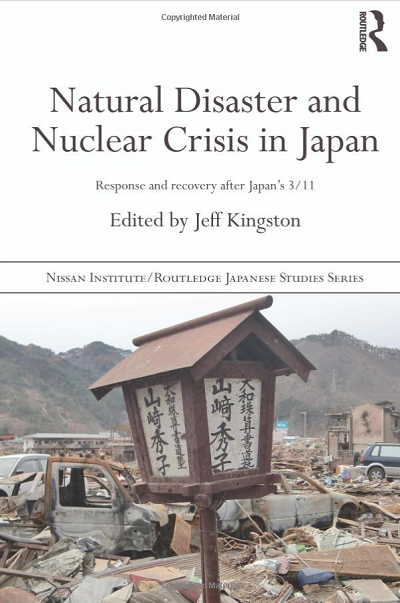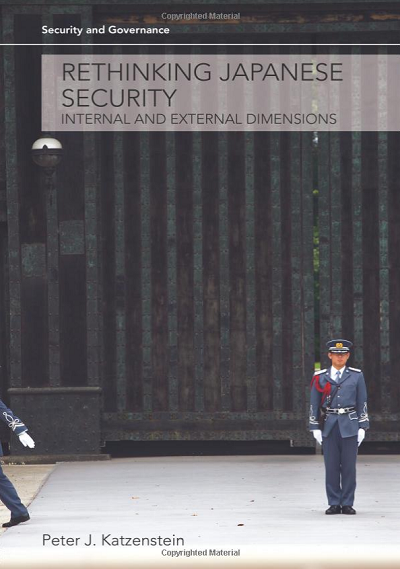 |
Edited by Yutaka Tsujinaka, and Hiroaki Inatsugu
(2017)
"Aftermath: Fukushima and the 3.11 Earthquake
(Japanese Society Series)"
Trans Pacific Press
Amazon
|
"Aftermath: Fukushima and the 3.11 Earthquake" is a
comprehensive analysis of recovery and
reconstruction following the triple disaster in
Japan on March 11, 2011. This collection addresses
the question of why, despite the relative success of
network governance in brokering a response to the
disaster and to reconstruction, politics failed
either to prepare for the disaster or to respond
adequately to it. In examining Japan's political
system leading up to 3/11, Aftermath looks at the
system of network governance that operated between
various organizations and levels of government. The
book scrutinizes the political influence network
that united politicians and the bureaucracy with the
major corporations and created a system to promote
nuclear power. Through political, policy, economic
and social analysis, Aftermath aims to contribute to
the development of mechanisms and structures to
minimize the impact of disasters.
|
 |
Yutaka Tsujinaka, Shakil Ahmed, and Yohei Kobashi
(2015)
"Constructing Co-Governance between Government and
Civil Society: An Institutional Approach to
Collaboration"
Edited by Ishtiaq Jamil, Salahuddin M.
Aminuzzaman, Sk. Tawfique M. Haque
Governance in South, Southeast, and East Asia:Trends, Issues and Challenges
Springer
Amazon
|
This book explores and analyzes governance and policy issues in South,
Southeast, and East Asia. It maps governance challenges and analyzes current
trends from the perspectives of democracy, public policy, and public
institutions. Regional public administration and governance systems have
undergone some phenomenal changes over the last three decades and have played
a key role in the economic progress of the area, especially in the Southeast
and East Asian nations. Rich with country-specific evidence and analyses, the
chapters in the book apply empirical and other research methods to examine
shifting paradigms and best practices. This book develops an understanding of
changes in the forms, process and practices of governance, both within the
context of each nation and in a comparative perspective. The book will appeal
to scholars, academics, students, and practitioners of public administration,
political science, and policy issues.
|
 |
Edited by Fahimul Quadir with Yutaka Tsujinaka
(2015)
Civil Society in Asia: In Search of Democracy and Development in Bangladesh
Routledge
Amazon
|
Notwithstanding Bangladesh's recent success in both creating a market
friendly structure of economic governance and holding periodic elections, its
political system continues to be marked by clientelism, rampant corruption and
widespread violence. The country faces the major challenges of fostering a
culture of democracy, human rights, and the rule of law as the politics of
mutual distrust have re-emerged with renewed strength into a dysfunctional
political landscape. This volume examines the failure of liberal democracy to
take root and asks, despite the presence of a vibrant civil society, why is
Bangladesh still struggling to institutionalize democracy? Providing much
needed analytical context to explore the theoretical and empirical dimensions
of the role of civil society in the democracy and development of Bangladesh,
the volume brings together well established international authors to explore
key ideas and debates from a wide range of disciplines. Through this the
contributors raise intriguing questions about the prospects for liberal
democracy and social development in a Muslim majority country.
|
 |
Edited by Robert J. Pekkanen, Steven Rathgeb Smith, and Yutaka Tsujinaka (2014)
Nonprofits and
Advocacy: Engaging Community and Government in an Era of Retrenchment
The Johns Hopkins University
Press
Amazon
|
Although nonprofit advocacy has received plenty of
attention in recent years, we have relatively little understanding of how
nonprofits advocate for themselves and their strategic considerations. These
central research questions animate this volume, and each chapter illuminates
part of the answer. This introduction outlines the key theoretical issues
involved in the analysis of advocacy and provides a more detailed definition
of advocacy. We explore three main themes that allow for deeper understanding
of advocacy in theory and practice: (1) limitations on advocacy, (2) the
significance of venue, and (3) the conditions under which advocacy can be
successful. We also introduce a remarkable set of international surveys—the
Japan Interest Group Surveys, or JIGS.
|
 |
Robert J. Pekkanen, Yutaka Tsujinaka, and Hidehiro Yamamoto
(2014)
Neighborhood Associations and Local Governance in Japan
Routledge
Amazon
|
This book draws on a unique and novel body of empirical
data derived from the first national survey of
neighborhood associations carried out in 2007 and
provides a multifaceted empirical portrait of
Japan’s neighborhood associations. It examines how
local associational structures affect the quality of
local governance, and thus the quality of life for
Japan’s citizens and residents, and illuminates the
way in which these ambiguous associations can help
us refine civil society theory and show how they
contribute to governance. As well as outlining the
key features of neighbourhood associations, the book
goes on to examine in detail the way in which
neighbourhood associations contribute to governance,
in terms of social capital, networks with other
community organizations, social service provision,
cooperation with local governments and political
participation.
|
 |
Robert Pekkanen, Yuko Kawamoto, and Yutaka Tsujinaka
(2012)
"Civil Society and the Triple Disasters: Revealed Strengths and Weaknesses" pp.78-93
Edited by Jeff Kingston
Natural Disaster and Nuclear Crisis in Japan:
Response and Recovery after Japan's 3/11
Routledge
Amazon
|
This book brings together the analysis and insights
of a group of distinguished experts on Japan to
examine what happened, how various institutions and
actors responded and what lessons can be drawn from
Japan’s disaster. The contributors, many of whom
experienced the disaster first hand, assess the
wide-ranging repercussions of this catastrophe and
how it is already reshaping Japanese culture,
politics, energy policy, and urban planning.
|
 |
Yutaka Tsujinaka (2010)
"Civil Society and Social Capital in Japan"
pp. 252-259
Edited by Helmut Anheier and Stefan Toepler
International Encyclopedia of Civil Society
Springer
Amazon
|
The term “civil society” and the related words such as “NGO”, and “NPO”, generally came into common use in Japanese mass
media since the 1990s, particularly after the Great Hanshin-Awaji Earthquake
in 1995. However, the substance of civil society (indicating here simply
social organizations independent from the modern state) has longer history in
Japan, while their nature has been problematic in academia. Although this may
be similar to the situation in other Asian countries, the context in which
these phrases have been used differs from that of Western societies in daily
life as well as academia.
|
 |
Robert Pekkanen and Yutaka Tsujinaka (2008)
"Neighbourhood Associations and the Demographic
Challenge" pp.707-720
Edited by F. Coulmas, H. Conrad, A. Schad-Seifert,
and G. Vogt
The Demographic Challenge: A Handbook about
Japan
Brill
Amazon
|
The chapter focuses on how neighborhood
associations respond to the so-called demographic challenge.
The authors posit that neighborhood associations are
key to tackling such social changes.
|
 |
Yutaka Tsujinaka (2008)
"Japan's Internal Security Policy" pp.76-103
Edited by Peter J. Katzenstein
Rethinking Japanese Security: Internal and
External Dimensions
Routledge
Amazon
|
Since the unexpected end of the Cold War, standard
arguments about power politics can no longer be
adopted uncritically. This has led to a renewed
interest in Japan's unusually peaceful security
policy. Japan's championing of "comprehensive
security" is central to this collection. Peter J.
Katzenstein's essays explore this concept which not
only encompasses traditional military concerns but
also domestic aspects of security.
|
 |
Yutaka Tsujinaka (2003)
"From Developmentalism to Maturity: Japan's Civil Society
Organizations in a Comparative Perspective" pp.83-115
Edited by Frank J. Schwartz and Susan J. Pharr
The State of Civil Society in Japan
Cambridge University Press
Amazon
|
In Chapter 4 the author attempts to measure
associational life in Japan and compare it with those
observed in the United States and Korea using three
different viewpoints, namely, state-recognized institutions, social
establishment, and active groups. The chapter provides
documented evidence to contribute to further debate
on the nature of civil society.
|
 |
David Knoke, Frantz Urban Pappi, Jefferey Broadbent, and Yutaka Tsujinaka
(1996)
Comparing Policy Networks: Labor Politics in the
U.S., Germany, and Japan
Cambridge University Press
Amazon
|
The United States, Germany, and Japan differ
strikingly in how their governments relate to their
economies. Comparing Policy Networks reports the
results of collaborative research by three teams
investigating the social organization and
policymaking processes of national labor policy
domains in the United States, Germany, and Japan
during the 1980s. Policy networks reveal similar
conflict within divisions between business and labor
interests, but also distinctive patterns each nation.
Unique combinations of informal policy-making
networks and the international political
institutions may in part explain the differences in
power structures and legislative decisions.
|
 |
Peter J. Katzenstein and Yutaka Tsujinaka (1995)
'"Bullying", "Buying", and "Binding": US-Japanese
Transnational Relations and Domestic Structures"'
pp. 79-111
Edited by Thomas Risse-Kappen
Bringing the Transnatinonal Relations Back In:
Non-State Actors, Domestic Structures and
International Institutions
Cambridge University Press
Amazon
|
In Chapter 3 Katzenstein and Tsujinaka argue that
the domestic structures of the United States and of
Japan both create incentives that may shape
governmental and non-governmental actors' political
actions.
|
 |
Yutaka Tsujinaka (1993)
"Rengo and Its Osmotic Networks" pp. 200-213
Edited by Gary D. Allison and Yasunori Sone
Political Dynamics in Contemporary Japan
Cornell University Press
Amazon
|
The purpose of this volume is to cast empirical
light on Japanese politics since the 1970s in order
to illuminate salient changes and to interpret their
significance. In Chapter 8, Tsujinaka argues about
Rengo, the Japanese Private Sector Trade Union
Federation, and its policy networks amid the
political changes.
|
 |
Peter J. Katzensein and Yutaka Tsujinaka (1991)
Defending the
Japanese State: Structures, Norms and the Political Responses to Terrorism and
Violent Social Protest in the 1970s and 1980s
Cornell University Press
Amazon
|
Based on extensive interviewing and documentary analysis, Defending the
Japanese State offers the most extensive English-language analysis available
of the organizational structures and normative foundations that have shaped
Japan's security policy as it was challenged by terrorists and violence-prone
social activists since the late 1960s. Along with Japan's National Security,
this book analyzes the structures and norms that are shaping Japan's policy on
internal and national security. The specific focus is on governmental,
state-society and transnational structures as well as the social and legal
norms that affect the policies of Japan's police and self-defense force.
|




















